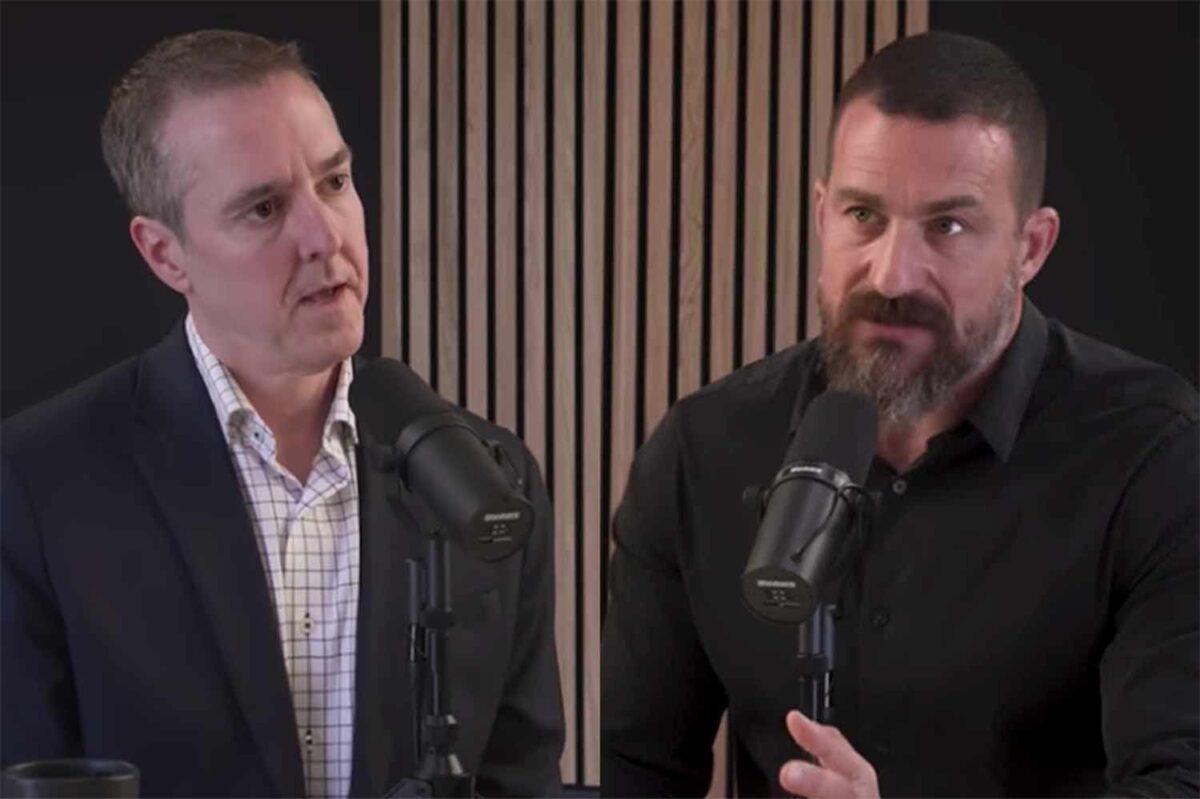We all know that exercise can boost your mood, but what about diet? A chat between American neuroscientist Andrew Huberman and Harvard psychiatrist Dr Chris Palmer recently explored the connection between nutrition and depression. Dr Chris Palmer also made his case for why he uses a ketogenic diet to help treat disorders like anxiety and depression in some of his clients.
We don’t want to go all Liver King on you (and you’d be right to be suspicious of a lot of the things in the online health space these days), but we’ve got an interesting chat about mental health and nutrition between two qualified experts that you really ought to hear.
American nutritionist Andrew Huberman, who recently went viral after going on Joe Rogan, recently sat down with Harvard psychiatrist Dr Chris Palmer to talk about the intimate relationship between diet and mental health.
As Huberman put it at the beginning of the podcast, “I think most people know what mental illness is… most people have some idea of what nutrition is… fewer people know how closely those things can interact.”
“They interact in a very intimate – maybe even causal – way,” Huberman said. “Over a long period of time what I ate yesterday, the day before, maybe even ten years ago could be impacting the way that my brain and body are making me feel now.”
No pressure.
Guest Dr Chris Palmer then told Huberman how he tried the Atkins diet in his 20s as a last resort when his doctor told him he would need to go on medication for his pre-diabetes. He ended up losing weight and feeling better, even if he did annoy some of his friends and family in the process.

“I had some friends and family who saw me, and saw that I had last some weight pretty easily. In particular, I remember my sister and my sister-in-law got really pissed at me one Thanksgiving because I could resist the pumpkin pie and apple pie and everything else. They were like: ‘how the hell are you doing that?’ They said: ‘how are you resisting all this food?’ and I said: ‘I don’t crave it anymore.'”
“I don’t want it, I’m fine I’m just having Turkey and green beans.”
Dr Chris Palmer
That was the point where he realised nutrition could “play a profound role in how you feel and operate.” He was still only a resident at that point though, so it was some years later before he started actually experimenting clinically with patients, and seeing how the ketogenic diet could be used to help treat things like anxiety and depression in conjunction with medication.
“Within a few years the primary thing I noticed was this powerful antidepressant effect,” Dr Palmer said. Now I’m an attending physician, I’ve got all these patients in my clinical practice with treatment-resistant mental illness.”
“I’m going to see if any of my patients are game to try it, to see if it might help them. Sure enough, it did.”
He added: “It didn’t help everyone and not everybody was interested/able to do it but some of the ones who were able to do it ended up having a remarkable and powerful antidepressant effect. One woman even became hypomanic within a month and she had been depressed pretty much non-stop for over 5 years – chronically depressed, suicidal in and out of hospitals.”
“I laid low at that point because at that point we didn’t have many clinical trials of the safety or efficacy of the Atkins diet for even weight loss, so I actually felt like I’m on the fringe here and this is not going to be met with praise from anyone – so I’m just going to lay low, offer it to patients and I went along that way up until 2016.”
“As the years went on, the field was advancing, more research was coming out [but] the thing that completely upended everything I knew as a psychiatrist though was when I helped a patient in 2016 lose weight. This was a patient, a 33-year-old man with schizoaffective disorder he had been my patient for 8 years.”

“He had daily auditory hallucinations, he had paranoid delusions, he could not go out in public without being terrified. He was convinced that there were these powerful families that had technologies that could control his thoughts; could broadcast his thoughts to other people, were trying to hurt him… this man was tormented by his illness.”
“It ruined his life. He had already tried 17 different medications and none of them stopped his symptoms but they did cause him to gain a lot of weight. So that’s him, he weighs 340 pounds, and for whatever reason, he gets it in his head I’m never going to get a girlfriend unless I lose some weight. He also recognises I’m never going to get a girlfriend because I’m a loser – I’m schizophrenic, I live with my father, I have nothing going for me, but I could at least try to address one of the awful horrible things about myself and maybe I could lose some weight. So he asked for my help.”
Dr Palmer added: “We ended up deciding to try the ketogenic diet. At this point I have no anticipation that the ketogenic dirt is going to do anything for his psychiatric symptoms because this man has a schizoaffective disorder – that’s not depression, depression is very different.”
“Within two weeks, not only does he start losing weight but I begin to notice this dramatic antidepressant effect – he’s making better eye contact, he’s smiling more, he’s talking a lot more. I’m thinking, ‘what’s gotten into you – you’re coming to life? I’ve never heard you talk this much, I’ve never seen you so excited or present or alive.’ I haven’t changed his meds at all.”
Dr Chris Palmer
“The thing that upended everything that I knew as a psychiatrist was six to eight weeks in he spontaneously starts reporting you know, all these voices that I hear all the time, they’re going away and he says ‘you know how I always thought there were all these families… who were out to get me,’ he says ‘you know what, now that I think about it, I don’t think that’s true and … it probably never was… I’ve probably had schizophrenia all along like everyone was trying to tell me.”
“He’s now lost 160 pounds and kept it off to this day. He was able to do things he had not been able to do from the time of his diagnosis. He was able to complete a certificate program, he’s able to go out in public and not be paranoid. He has performed improv in front of a live audience. At one point he was able to move out of his father’s home and live independently. That completely blew my mind as a psychiatrist and I went on a scientific journey to understand what in the hell just happened.”
When Huberman asked: “Did he stay on any kind of antipsychotic or any other medication (and if so were the dosages adjusted)” Dr Palmer made it clear that he isn’t endorsing a keto diet instead of medication, but rather as another tool to help treat it – for some people – under the guidance of medical professionals.
He answered: “In terms of medications, he has remained on medications. Early on I wasn’t adjusting anything. I was just in disbelief and shock that this was happening. Over the years we have slowly but surely tried to taper him off his meds – he has been on meds for decades, he started medications when he was a young child, his brain has developed in response to all sorts of psychiatric medications and it has not been easy to try to get him off. We continue to try and it’s challenging and difficult.”“Getting off your meds is very difficult and dangerous and you need to do it with supervision, with a mental health professional or prescriber.”
Dr Chris Palmer
RELATED: I Solved My Quarter-Life Crisis With A Skateboard
“Junk food, meaning highly processed foods that are usually high in both sugar and carbohydrates – carbs and fats – those seem to be the worst foods that combination of high sugar, high fat for metabolic health. We’ve got emerging data that strongly suggests it’s also bad for mental health.”
“As for the exact level of ketones, it really depends on the patient and what I’m treating. I don’t think every patient needs the ketogenic diet. For some patients simply getting rid of junk food can make a huge difference in a mood disorder for instance.” Dr Chris Palmer
He added: “Depression and anxiety are the most common mental disorders and so we have the best data for those disorders, but we actually have a lot of data even with bipolar disorder and schizophrenia that insulin resistance in particular and insulin signalling in the brain is impaired in people with chronic mental health disorders kind of across the board – all the way from chronic anxiety and depression to bipolar and schizophrenia to Alzheimer’s.”
“We know that patients with all of those disorders have impaired glucose metabolism and that the insulin signalling system in the brain which is different than insulin signalling in the periphery seems to somehow possibly be playing a role. So for some patients, I might just want to reduce glucose and insulin level and I can do that by getting rid of sweets.”
“For other patients, like patients with schizoaffective disorder or bipolar (especially if it’s chronic), if I’m using it as a brain treatment then I do want a ketogenic diet and I usually want reasonably high levels of blood ketones. For depression, I usually want to see at least greater than 0.8. For psychotic disorders and bipolar disorders, I want to see levels of greater than 1.5 – that’s what I’m shooting for.”
RELATED: Lebron James’ Ketogenic Diet Could Be Your Ticket To Becoming A Shredded Beast… But At What Cost?
Huberman added: “I’m very relieved to hear what you said earlier, which was you never said that people should come off their medication and just go on a ketogenic diet and everything will be cured … rather you’re saying, if I understand it correctly, that nutrition needs to be considered one of the major tools in the landscape of effective tools and that it can be very effective evidenced by the story that you just shared.”
This in mind, you should always consult a qualified health professional before making any major changes to your diet or lifestyle. But hearing stories like the above can be a great inspiration to get you started looking for help, and to get you going on your journey.
Read Next- Aussie Bloke Shows How Boxing Can Help You Kick Depression’s Ass
- How To Make Your Mates Comfortable Sharing Their Feelings With You
The post Eating A Ketogenic Diet Could Make You Less Anxious & Depressed, Harvard Psychiatrist Says appeared first on DMARGE.
0 Commentaires